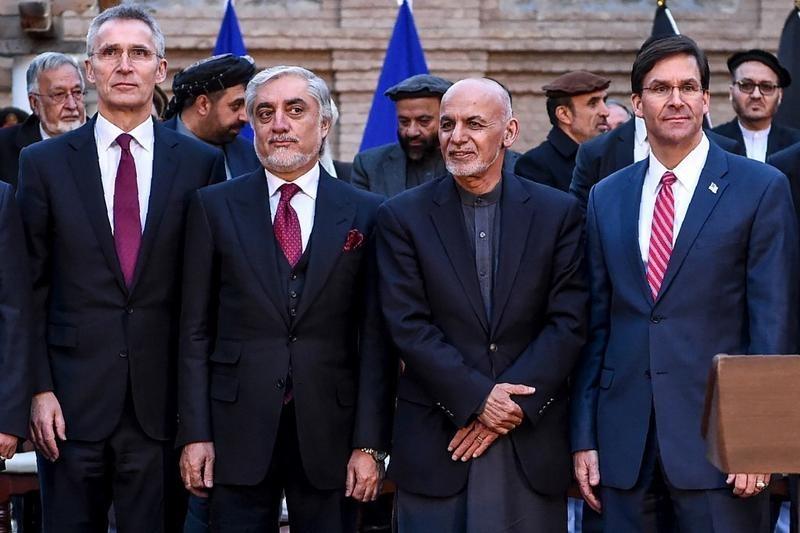 In this Feb 29, 2020 file photo, NATO Secretary General Jens Stoltenberg (left) pose along with Afghan presidential election opposition candidate Abdullah Abdullah (second left), Afghanistan's President Ashraf Ghani (second right) and US Secretary of Defense Mark Esper (right) after a press conference at the presidential palace in Kabul. (WAKIL KOHSAR / AFP)
In this Feb 29, 2020 file photo, NATO Secretary General Jens Stoltenberg (left) pose along with Afghan presidential election opposition candidate Abdullah Abdullah (second left), Afghanistan's President Ashraf Ghani (second right) and US Secretary of Defense Mark Esper (right) after a press conference at the presidential palace in Kabul. (WAKIL KOHSAR / AFP)
UNITED NATIONS — A UN envoy for Afghanistan on Tuesday warned against political brinkmanship in the war-torn country -- at a time when COVID-19 is making the situation even more complex.
"Afghanistan appears to be reaching a defining moment," Ingrid Hayden, the UN secretary-general's deputy special representative for Afghanistan, told the Security Council, referring to the political impasse between President Ashraf Ghani and former Chief Executive Abdullah Abdullah.
The political brinkmanship prompted serious concerns in many quarters of the potential for a dangerous miscalculation which could have long-lasting implications for the future of the country
Ingrid Hayden, the UN secretary-general's deputy special representative for Afghanistan
Ghani was announced the winner of the Sept 28, 2019, presidential election, and was sworn in for a second term on March 9, 2020. Abdullah rejected the outcome and held a parallel presidential inauguration on the same day.
"Almost two decades after the start of the coalition intervention, the question for the Islamic Republic now is: can its leaders rally together to engage in meaningful talks with the Taliban to achieve a sustainable peace? The choice is made stark by the all-encompassing threat of COVID-19, which poses grave dangers to the health of Afghanistan's population and, potentially, to the stability of its institutions," said Hayden.
The political brinkmanship prompted serious concerns in many quarters, Afghans and internationals alike, of the potential for a dangerous miscalculation which could have long-lasting implications for the future of the country, she said.
ALSO READ: Taliban, Afghan govt to meet for talks
The impasse continues, despite intensive engagement by key stakeholders, particularly the United States, regional actors and Afghan political leaders. The seriousness of the situation is underlined by the US decision on March 23 to immediately reduce assistance by US$1 billion for 2020 and Washington's preparedness to do the same again the year after, she noted.
"Given the state's heavy reliance on donor funding, this could have severe consequences for Afghanistan's fiscal viability, as well as for socio-economic outcomes in the country. Now, with the onslaught of COVID-19, many donors are likely to turn inward to meet the needs of their own population. Afghanistan needs to demonstrate a compelling case for the continued investment of international resources."
READ MORE: Official: Afghan prisoners exchange postponed
The UN Assistance Mission in Afghanistan is urging all Afghan parties to work together to resolve their differences peacefully for the good of the people of Afghanistan, said Hayden. "Now is not the time for divisions. Now is the time for statesmanship, accommodation and inclusivity. The interests of Afghans must come first, including the rights of all women, minorities and youth."


